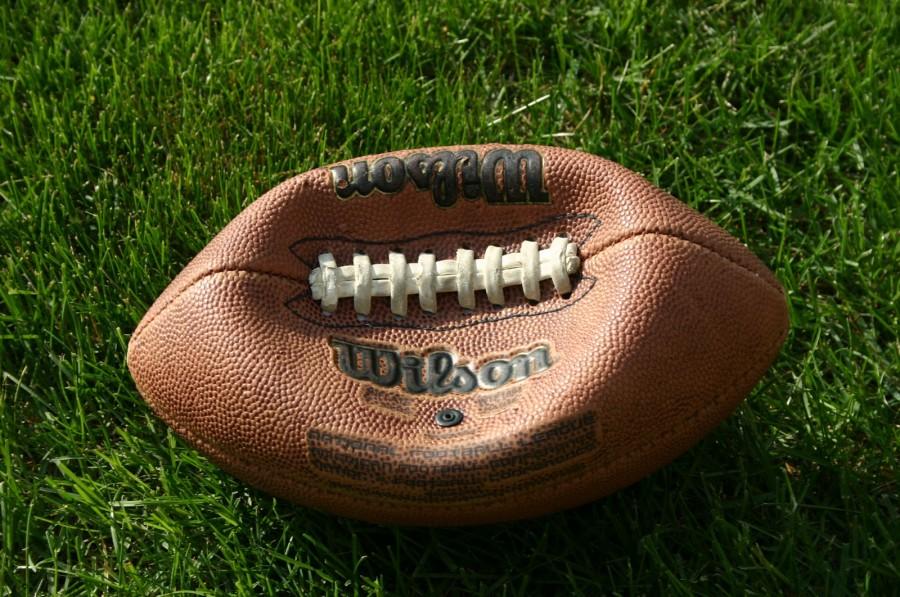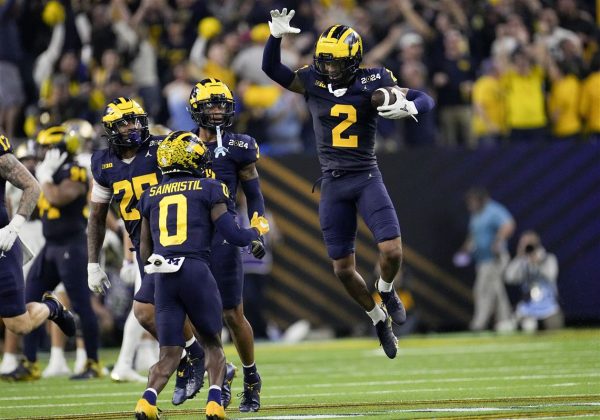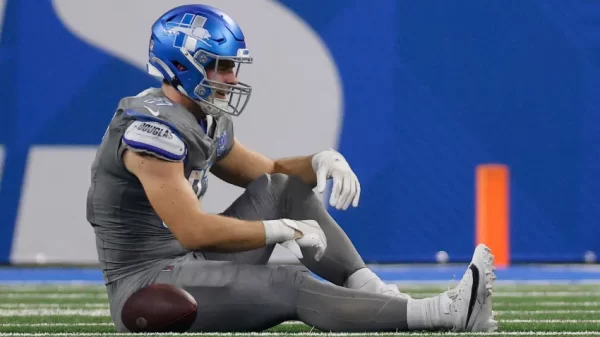Cheater, Cheater? Adams’ Reaction to Deflategate Highlights Problem
This issue has raised concern over cheating in high school athletics.
All is not well on Mount Olympus.
Tom Brady, one of the most iconic figureheads in all of professional sports, has become the subject of nationwide derision following the release of the Ted Wells Report. The report, named after attorney Ted Wells whom Commissioner Roger Goodell appointed to lead the investigation, found that Tom Brady was “at least generally aware of the inappropriate activities” that took place before and during this past AFC Championship Game.
The “inappropriate activities” were in reference to the illegal deflation of the footballs used in the AFC Championship. Though the investigation showed that it was select members of the Patriots’ equipment management team who deflated the footballs, not Brady, it also showed significant evidence to support Brady not only knew about the illegal activity, but actually helped to orchestrate it. This all added up to very serious charges for Tom Brady and company, enough to get a large fine and maybe even a game suspension.
However, it was not these actions alone that earned Brady a whopping four-game suspension. More to do with it was his lack of cooperation and straight-up lying that took place during the investigation. The biggest offense was refusing to hand over his cell phone which contained evidence of a text conversation with officials’ locker room attendant Jim McNally and equipment assistant John Jastremski, the main culprits of Deflategate. In these conversations, the men discuss their plans to carry out the offense.
The New England Patriots and NFL Players Association have decided to appeal the four-game suspension, claiming a lack of concrete evidence to link Brady to the crime. Brady’s agent, Don Yee, has also claimed to find many inconsistencies within the Wells Report. While the odds of Brady’s suspension being erased seem slim, it’s not unlikely that we see it cut in half to a two-game suspension.
Whether or not Patriots fans get their wish of a shorter suspension granted, the damage has been done. The Patriots, only a few years removed from the Spygate scandal, have been branded cheaters, with Brady at the forefront. Many have begun to question the validity of the Super Bowl they won after cheating, along with the ones before.
Fair or not, being branded a cheater causes the team to lose credibility, and Brady’s accomplishments are no different. Brady’s legacy has come under serious fire in recent weeks, with many questioning Brady’s status on the NFL’s pantheon of all stars. With opinions ranging from outrage to nonchalance, it is still unclear how clean Brady’s reputation will exit this scandal. AHS freshman wrestler Nick Mathews, for one, is still a fan.
“[Tom Brady] is one of the biggest real-life underdog stories that you’ll see” said Mathews. “He was picked 199th [in the draft] and didn’t get any playing time. Then [Drew Bledsoe] got injured, [Brady] went in and completely took off. I don’t think this really affects his accomplishments. Yes, the fourth Super Bowl may be tainted, but he’s got three others.”
Some, like sophomore softball player Kate Hartway, are less forgiving.
“There should be a certain integrity to sports” said Hartway. “I understand that once you get to the professional level there is an intense pressure to win, but you can’t betray that integrity.”
Others still, like senior lacrosse player Cayla McNeil, are not surprised by the recent developments.
“I think all professional leagues do it for money and are scandalous in their own ways, so I would have expected it from him,” said McNeil.
The broad array of responses brings light to a bigger question: what really counts as cheating, and is it ok? In a sample interview of 15 AHS student athletes, all claimed that they would never cheat at sports. However, more startling was their response to the next question: if you caught a teammate cheating, would you let it slide? Over half of these students said that they would not report their teammate under any circumstance. About 15 percent of others said that they might, depending on the situation. Only 30 percent showed an unwillingness to turn a blind eye.
On the surface, this may not seem to raise any red flags. After all, no one likes to be a tattle tale. And as senior soccer player Caitlin Richardson put it, “Unless it’s the state championship, I don’t see why it’s a big deal.”
This was a common sentiment among students, with the phrase “it’s only high school” popping up more than once.
“I’d say small cheating happens a lot. I think everyone does it,”said sophomore cross country runner Klara Schmidt.
While it’s clear that no malfeasance is intended, and that all students agreed that cheating is wrong, the students’ consensus that ratting out cheaters is unacceptable shows the underlying problem here at RCS. With no clear line between acceptable cheating and excessive cheating, who is to say what is and isn’t acceptable? Sure, these students aren/t bad people or even dishonest competitors, but if they’re willing to look the other way when cheating occurs, how are they any different from Tom Brady? The same action that drew the ire of athletes across the nation in the pros, is shrugged off and dismissed at the high school level, where athletes are taught how they’ll compete for the rest of their lives. It doesn’t take long for these misdeeds to escalate, even at this early stage.
Adams’ students can recite from a seemingly endless list of cheating examples. Though they lacked evidence, junior football player P.J. Wardle and junior hockey player Kyle Stilwell spoke with total conviction.
“[Cheating] definitely happens in the district, I guarantee there are kids who use steroids,” said Wardle.
“All kinds [of cheating] happens in the district. Non-registered players being allowed to play and other things like that,” added Stilwell.
Other examples of cheating happen behind closed doors.
“In wrestling, some teams won’t be honest with what their kid’s weights are, so they will wrestle kids in lower weight classes. They don’t check the weight until later in the season,” Mathews said.
“For cheer, some people practice extra hours that they’re not allowed to practice to gain a competitive advantage,” Dawn said.
Even more examples are much more obvious.
“I’ve seen girls persuading the referees to call the game their way, and coaches have done it too,” senior lacrosse player Cayla McNeil said.
Finally, and most grotesquely, is the example provided by senior soccer player Caitlin Richardson.
“A couple of years ago Rochester [High School] brought down some varsity players to play against the JV team in a game against Adams. They do it for cheer too,” Richardson disclosed.
But why does any of this really matter? Like so many students said, “it’s only high school”. So what if someone cuts a corner in track, or doesn’t touch home in softball – what harm could this possibly do?
Sowing seeds of dishonesty at an early age can only lead kids further down a slippery slope. Cutting corners in sports leads to cutting corners elsewhere. Turning a blind eye can lead to turning a back on the rules entirely. This continuously fuels the hordes of Wall Street sharks, tax dodgers, identity thieves and all the other kinds of everyday cheaters.
Make no mistake; none of these kids are bad people. However, left unchecked, these messages sent by coaches and players alike can lead to bad ends for everyone involved.








